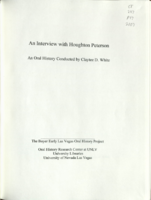Search the Special Collections and Archives Portal
Search Results

Sam Diaz interview, January 3, 2020: transcript
Date
Archival Collection
Description
Interviewed by Elsa Lopez. Sam Diaz was born in Los Angeles California, but was raised in Chula Vista, California. He is a police officer with the Las Vegas Metropolitan Police Department and has worked for LVMPD since 2007. He has served in in the U.S. Air Force Reserves since 2008, and served in the U.S. Air Force from 2001 to 2007. Diaz describes his multi-cultural upbringing and growing up in such close proximity to the U.S.-Mexico border. He describes his passion for serving which he had since a young age. He describes his incorporation within every community he has been a part of and talks about the ways he has worked to serve the Las Vegas community since moving here in 2007. He recounts the tragic night of 1 October, the mass shooting that occurred during the Route 91 Harvest music festival on October 1st, 2017 on the Las Vegas Strip. He talks about the various changes that happened within LVMPD since 1 October, and changes that he has seen in the Latinx community throughout the Las Vegas Valley. Diaz also describes the process of adopting two children and raising a multi-racial family with his wife in Las Vegas.
Text

Transcript of interview with Houghton Hoot Peterson by Claytee White, May 20, 2010
Date
Archival Collection
Description
Houghton Hoot Peterson played trombone in his high school band in northern Minnesota where he grew up. That same instrument would lead him to be a member of the highly regarded Air Force jazz band called Airmen of Note after enlistment. Then during a short tour at Nellis Air Force base, Hoot decided that the Las Vegas entertainment scene might have career opportunities for him. He moved to Las Vegas in 1962, an era of celebrity performers and tourists who enjoyed the crowds and nightlife. Hoot's point of view was as a musician in the band, most often a Strip relief band. But he also has tales of famous musicians and late night jam sessions. Hoot's career spanned 20 years. Eventually the Las Vegas scene for live musicians began to change. When times got tough for Hoot, he worked as a carpenter and at a music store. In this interview he discusses his fascinating past and offers advice for today's musicians.
Text

Transcript of interview with Richard Leigon by Stefani Evans and Claytee White, January 12, 2017
Date
Archival Collection
Description
The first part of this Shakespearean quote perfectly describes the deep admiration and love that Richard Leigon has for his father, International Brotherhood of Electrical Workers (IBEW) leader Ralph Leigon. The elder Leigon's major contributions include 39 various positions from the Nevada State American Federation of Labor and Congress of Industrial Organizations (AFL-CIO), Nevada State Democratic Party, and the Southern Nevada Building Trades Council. Richard speaks upon the early years of Las Vegas with the allure of atomic testing, going to school with future community leaders Jerome Mack, Shelley (Levine) Berkeley, and Beth Molasky as well as the role of the union in building Las Vegas. After graduating from Las Vegas High School, he attended Somona State University and obtained a degree in humanistic psychology where he furthered his father’s influence on becoming a ‘we’ person. He came back to Las Vegas to start his 40-year career as an active member of Local 357 as executive
Text

Transcript of interview with Yvonne and Joni Fried by Barbara Tabach, February 17, 2016
Date
Archival Collection
Description
Yvonne Fried, M.D., and Joan “Joni” Fried are the daughters of Milton and Esther Fried, the founders of Freed’s Bakery—the standard to which all other Las Vegas bakeries are held. When the Fried family moved to Las Vegas in 1955, Joni was born here, the fifth child, of the entrepreneurial Milton, a musician by night, and his industrious wife Esther, who guided the family business. As Esther’s 2006 obituary reads: in 1959 the couple opened “a snack bar, selling donuts and Danish, at the Panorama Market on West Charleston, while Milt played in the show band at the Sahara Hotel in the evenings.” For Yvonne and Joni, this made for a rather busy and interesting household to grow up in. Their Jewish upbringing was at Temple Beth Sholom. Photo above honors the multi-generations of the Freed’s Bakery tradition: (L-R) Joni Fried, Anthony & Sarah Fusco (Joni’s daughter) Max Jacobson Fried (Yvonne’s son) holding his son Lucas, and (far right) is his wife Emilia.
Text

Transcript of interview with Arlene Blut by Barbara Tabach, May 28, 2015
Date
Archival Collection
Description
In this interview, Arlene discusses her family and important friendships; her relations with and impressions of the disparate Las Vegas Jewish communities; the meaningful ways her Jewish relationships in Duluth, Winnipeg, and Las Vegas intertwine; her theatrical, professional, and philanthropic work; the reasons she and Jerry became active Zionists; and their support for Israeli causes. Her liberal sprinkling of Yiddish terms enriches her speech as it exemplifies her deep cultural attachment to and identification with her Jewish heritage, despite the fact that her wide and diverse circle of friends remains predominantly non-Jewish.
Actor, director, friend, mother, producer, wife, and volunteer extraordinaire Arlene Piekoff (now Blut) arrived in Las Vegas in 1971 with two young children and husband, Michael Peikoff, who was opening a surgical practice. Arlene was born and raised in Duluth, Minnesota, where she attended a Conservative Jewish temple but had mostly non-Jewish friends. She met Michael at the University of Minnesota, and they married before he began medical school in Winnipeg, Manitoba, Canada. Arlene and Michael followed his residencies and fellowships to California, Michigan, and Manitoba before they came to Las Vegas Through her brother in law and Ayn Rand?s intellectual heir, Leonard Peikoff, Arlene was exposed to Ayn Rand Objectivism, a philosophy that still influences her political outlook. After her 1975 divorce she began working at the Jockey Club; founded the Meadows Playhouse, Las Vegas?s first professional black box theater; and started Renta Yenta, the valley?s first full-service event planning business. In 1980 she married tax attorney Jerry Blut in a Renta-Yenta-produced, Fiddler-on-the-Roof-themed wedding at Paul Anka's Jubilation Restaurant.
Text

Transcript of interview with Steven Eisen by Barbara Tabach, September 14, 2016
Date
Archival Collection
Description
Steven Eisen (1966 - ) is the oldest son of Barry and Beverly Eisen, who were part of the migration of Jews from St. Louis to Las Vegas in the 1960s. He is married to Stacy Fisher and the older brother to Andrew and Robert Eisen. They are members of an early group of born-and-raised Las Vegans. Growing up Jewish, he became a bar mitzvah, belonged to B?nai B?rith Youth Organization. In this oral history interview, Steve recalls enjoyable stories of growing up in Las Vegas and humorous anecdotes of mistaken identity since the three brothers bear such strong physical resemblances. Today he finds himself enjoying his career as CEO of the Children?s Heart Center since 2001 and talks about the success and reputation of the pediatric medical group. It was his first job as a fourteen year old helping Theodore Manos and Michael Cherry during the MGM fire litigations where he learned about the legal world and being organized as a path to success in whatever he might pursue. Steve graduated from University of Missouri, attended law school at Washington University in St. Louis, and received his business degree from UNLV. Throughout the interview, he recalls the steady and strong involvement of his parents in their sons? educations. He also describes their active connection with the Jewish community and organizations. Steve?s wife Stacy is a professor in physical therapy at Touro University.
Text

Transcript of interview with Janet Garry by Elyse Rozinsky, February 24, 1979
Date
Archival Collection
Description
On February 24, 1979, collector Elyse Rozinsky interviewed file clerk, Janet Garry, (born on November 24th, 1927, in Louisiana) at her home in Bonanza Village Trailer Park in Las Vegas, Nevada. This interview covers the growth of Las Vegas from 1952 to 1979. Janet recalls the early years of the television and the telephone. She also discusses her own personal experience of raising a family in Las Vegas.
Text

Transcript of interview with Agnes Gauger by Coleen Mancini, February 24, 1977
Date
Archival Collection
Description
On February 24, 1977, Coleen Mancini interviewed the claims manager for the Culinary Workers and Bartenders Insurance Fund, Agnes Gauger (born Coleen Evans on November 21, 1926 in Arkansas) in her home in Las Vegas, Nevada. Mrs. Gauger’s daughter, Traci Sturdivant was also present during the interview. This interview covers significant changes and growth in Southern Nevada, including gambling and other industries, family life and recreation, and early atomic tests. Mrs. Gauger also discusses housing in the Las Vegas, Howard Hughes, McCarran Airport, medical facilities and education in Southern Nevada.
Text

Transcript of interview with Tony Grasso by Coleen Seifert, February 29 & March 1, 1980
Date
Archival Collection
Description
On February 29, 1980, Coleen Seifert interviewed Tony Grasso (born 1926 in Brooklyn, New York) about his career in gaming. Grasso first provides details on his background and how he ended up moving to Las Vegas in 1951 before talking about his experience as a dealer in some of the early casinos. He also talks a little about the different roles and games that casino workers deal and how players are invited to visit casinos. The interview concludes with a discussion on gaming unions and Grasso’s future plans. On a date that soon followed the above date, Seifert also interviewed Doug Charles (born 1954 in Brooklyn, New York) about his career in the gaming industry. Charles also talks about his family background, his arrival to Las Vegas in 1957, and the early development of the various gaming properties in Las Vegas. He later goes into detail over some of his experiences as a dealer, his opinions on mob control over gaming, and some of the political and legal issues that have arisen in La
Text

Transcript of interview with Emma Ellsworth by Clark Ellsworth, March 5, 1980
Date
Archival Collection
Description
On March 5, 1980, Clark Ellsworth interviewed his grandmother, Emma Ellsworth (born 1902 in Payson, Utah) about her experiences in Southern Nevada. Ellsworth first talks about growing up in Utah and getting married before moving to Pioche, Nevada during the Great Depression. She also talks about bringing up a family in Las Vegas as well as her and her husband’s work in running Beneficial Life, a life insurance business, in Las Vegas. Ellsworth also talks about the Mormon churches in Las Vegas, the schools her children attended, and the number of grandchildren and great-grandchildren she had at the time.
Text
